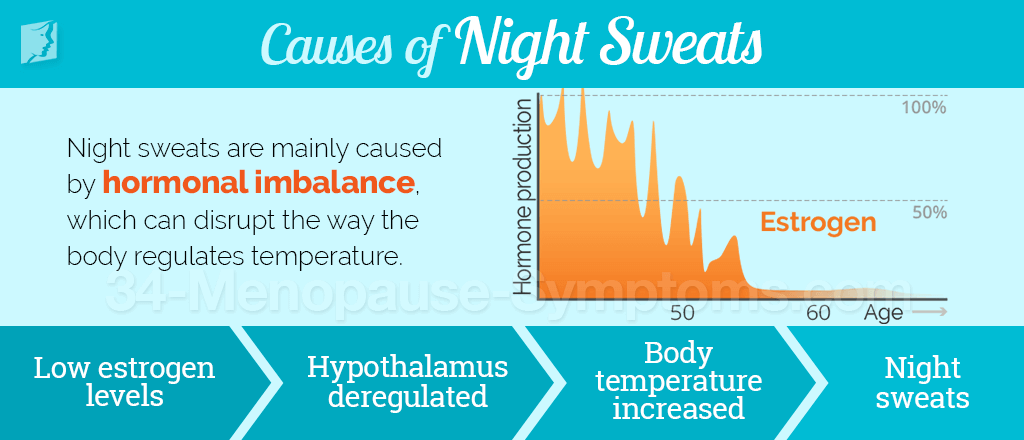While the exact cause of night sweats is unknown, hormonal fluctuations are one of the primary factors in most menopause symptoms. In rare cases, certain medical conditions can prompt symptoms like night sweats. However, they are not typically the cause of night sweats in menopausal women.
Along with hormonal imbalance, certain lifestyle habits can provoke or increase the severity of night sweats.
Learning about the causes of night sweats and their triggers can be an important step toward managing night sweats episodes. Read on to learn more about the causes of night sweats.
Hormonal Causes
Many doctors believe that hormonal imbalance is the primary cause of night sweats during menopause. During this transition, the body decreases the production of estrogen, testosterone, and progesterone, which can trigger a myriad of menopause symptoms, including night sweats.
The sudden decrease in estrogen affects the hypothalamus, the region of the brain responsible for regulating body temperature.
During menopause, the hypothalamus receives false signals, believing the body is overheating. It then sends out signals to the body to dispel this perceived heat, increasing heart rate and sweat production and decreasing blood pressure and temperature. As a result, menopausal women experience hot flashes and night sweats.
While hormonal imbalance is the primary cause of night sweats during menopause, medical conditions can also cause night sweats. Read on to learn more about the other possible causes of night sweats.

Other Causes of Night Sweats
While the most common cause of night sweats during the menopausal transition is fluctuating hormone levels, night sweats can also be a symptom of other medical conditions, such as:

- Hypoglycemia
- Diabetes
- Certain medications (e.g., antidepressants and psychotic drugs)
- Infections (e.g., tuberculosis)
- Hormone disorders (e.g., hyperthyroidism)
- Neurological conditions (e.g., stroke)
- Anxiety
- Sleep apnea
- Cancer
Along with these causes of night sweats, a number of environmental, psychological, and behavioral triggers can set off or intensify night sweats. Keep reading to learn more about these triggers to best understand what to avoid in order to reduce the frequency and severity of this common menopause symptom.
Triggers of Night Sweats
Certain factors can intensify night sweats or make them more frequent. Avoiding these triggers can help many menopausal women alleviate both hot flashes and night sweats.
Environmental Triggers
- Excess bedding Close proximity to partner
- Hot rooms
- Warm weather Saunas, tubs, and hot showers
Emotional Triggers
- Stress
- Anxiety
- Disturbing dreams
Behavioral Triggers
- Hot or spicy foods Alcohol
- Caffeine
- Diet pills
- Smoking
- Drug use
Important Note
While avoiding these triggers helps to reduce the frequency of night sweats, it may not be enough to provide relief. Treating the underlying cause of hormonal imbalance, often through natural remedies, is the most effective way to alleviate this symptom.
To determine the causes or provoking factors of night sweats, it's helpful to keep track of the presence of these triggers in your daily life. Noticing that night sweats often follow particular triggers, such as a certain type of food or a stressful day, can help you to avoid these factors in the future and even decrease the frequency of night sweats.
Understanding the causes of night sweats is just the beginning to learning how to live with, and perhaps even rid yourself of, night sweats. Click here to learn about night sweat treatments, including important lifestyle changes, natural remedies, and medical options.
Sources
- Boston Women's Health Collective. (2006). Hot Flashes, Night Sweats and Sleep Disturbances. Our Bodies, Ourselves.
- National Health Service UK. (2014). Menopause: five self-help tips. Retrieved April 7, 2016, from http://www.nhs.uk/Livewell/menopause/Pages/Menopauseselfhelp.aspx
- National Institute on Aging. (2015). Signs of the Menopausal Transition. Retrieved April 7, 2016, from https://www.nia.nih.gov/health/publication/menopause-time-change/signs-menopausal-transition



